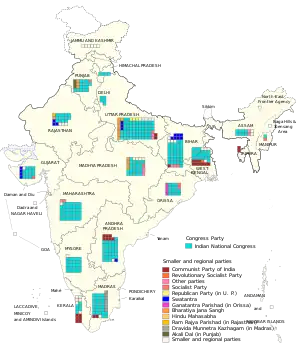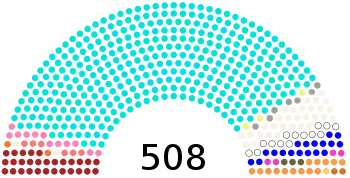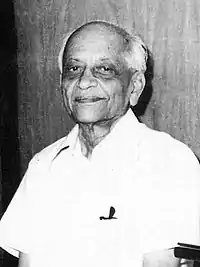1962 Indian general election
General elections were held in India between 19 and 25 February 1962 to elect members of the third Lok Sabha. Unlike the previous two elections, each constituency elected a single member.[1]
| ||||||||||||||||||||||||||||
494 of the 508 seats in the Lok Sabha 248 seats needed for a majority | ||||||||||||||||||||||||||||
|---|---|---|---|---|---|---|---|---|---|---|---|---|---|---|---|---|---|---|---|---|---|---|---|---|---|---|---|---|
| Registered | 216,361,569 | |||||||||||||||||||||||||||
| Turnout | 55.42% ( | |||||||||||||||||||||||||||
| ||||||||||||||||||||||||||||
 Results by constituency | ||||||||||||||||||||||||||||
| ||||||||||||||||||||||||||||
Jawaharlal Nehru won another landslide victory in his third and final election campaign. The Indian National Congress received 44.7% of the vote and won 361 of the 494 elected seats. This was only slightly lower than in the previous two elections and they still held over 70% of the seats in the Lok Sabha.
Results
 | |||||
|---|---|---|---|---|---|
| Party | Votes | % | Seats | +/– | |
| Indian National Congress | 51,509,084 | 44.72 | 361 | –10 | |
| Communist Party of India | 11,450,037 | 9.94 | 29 | +2 | |
| Swatantra Party | 9,085,252 | 7.89 | 18 | New | |
| Praja Socialist Party | 7,848,345 | 6.81 | 12 | –7 | |
| Bharatiya Jana Sangh | 7,415,170 | 6.44 | 14 | +10 | |
| Republican Party of India | 3,255,985 | 2.83 | 3 | New | |
| Socialist Party | 3,099,397 | 2.69 | 6 | New | |
| Dravida Munnetra Kazhagam | 2,315,610 | 2.01 | 7 | New | |
| Akali Dal | 829,129 | 0.72 | 3 | New | |
| All India Forward Bloc | 826,588 | 0.72 | 2 | 0 | |
| Hindu Mahasabha | 747,861 | 0.65 | 1 | 0 | |
| Peasants and Workers Party of India | 703,582 | 0.61 | 0 | –4 | |
| Akhil Bharatiya Ram Rajya Parishad | 688,990 | 0.60 | 2 | +2 | |
| Jharkhand Party | 467,338 | 0.41 | 3 | –3 | |
| Revolutionary Socialist Party (RSP) | 451,717 | 0.39 | 2 | +2 | |
| Indian Union Muslim League | 417,761 | 0.36 | 2 | New | |
| All India Ganatantra Parishad | 342,970 | 0.30 | 4 | –3 | |
| Lok Sewak Sangh | 281,755 | 0.24 | 2 | New | |
| Nutan Maha Gujarat Janata Parishad | 195,812 | 0.17 | 1 | New | |
| Haryana Lok Samiti | 118,667 | 0.10 | 1 | New | |
| Tamil National Party | 92,389 | 0.08 | 0 | New | |
| All Party Hill Leaders Conference | 91,850 | 0.08 | 1 | New | |
| Socialist Labour Party | 80,227 | 0.07 | 0 | New | |
| Revolutionary Socialist Party (RCP) | 60,813 | 0.05 | 0 | New | |
| Gorkha League | 46,127 | 0.04 | 0 | New | |
| Eastern Indian Tribal Union | 12,574 | 0.01 | 0 | New | |
| We Tamil | 11,372 | 0.01 | 0 | New | |
| Independents | 12,722,488 | 11.05 | 20 | –22 | |
| Appointed members[lower-alpha 1] | 14 | +3 | |||
| Total | 115,168,890 | 100.00 | 508 | +3 | |
| Valid votes | 115,168,890 | 96.05 | |||
| Invalid/blank votes | 4,735,394 | 3.95 | |||
| Total votes | 119,904,284 | 100.00 | |||
| Registered voters/turnout | 216,361,569 | 55.42 | |||
- Six representing Jammu and Kashmir, two representing Anglo-Indians, one representing the Amindive, Laccadive and Minicoy Islands, one representing the Andaman and Nicobar Islands, one representing Dadra and Nagar Haveli, one representing Goa, Daman and Diu, one representing the North-East Frontier Agency and one representing the Tuensang and Naga Hills districts in Nagaland.
By-elections
In 1963, a by-election was held for the Bilaspur Lok Sabha seat, which was at the time in Madhya Pradesh. The election was won by the Indian National Congress candidate C. Singh, with 86,229 votes, against M. L. Shukla of Jana Sangh with 54,156 votes.[2] This by-election was needed because the original election for this seat was declared void by the Madhya Pradesh High Court, which judged that the nomination papers of one of the candidates, Bashir Ahmed Qureshi, "was improperly and illegally rejected by the Returning Officer".[3]
See also
References
- "Statistical Report On General Elections, 1962 To The Third Lok Sabha" (PDF). Election Commission of India. Archived from the original (PDF) on 18 July 2014. Retrieved 30 April 2014.
- "Details of Bye Elections from 1952 to 1995". ECI, New Delhi. Retrieved 13 September 2017.
- P. Dixit; K. Pandey (22 April 1963). "Satya Prakash vs Bashir Ahmed Qureshi". Retrieved 15 October 2021.
our conclusion is that the respondent's nomination was improperly and illegally rejected by the Returning Officer and the Election Tribunal rightly declared the appellant's election as void.

